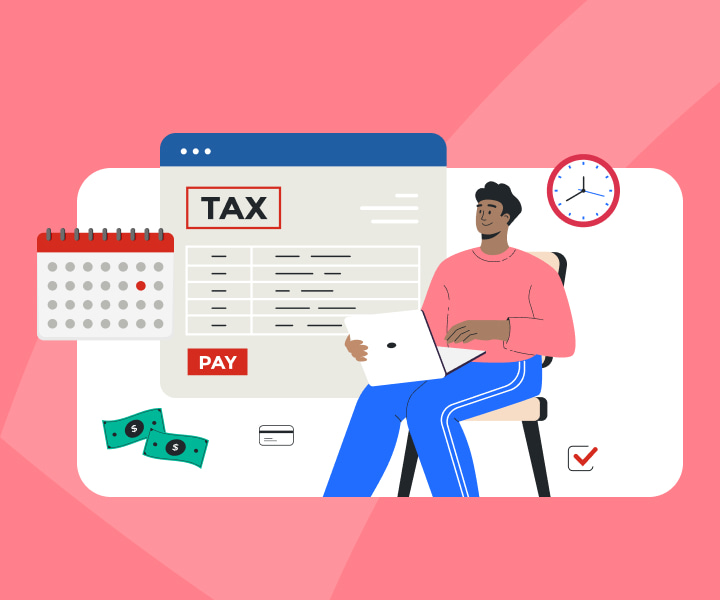A Guide to Expat Taxation: How Are Expats Taxed in Canada?
TurboTax Canada
October 13, 2023 | 1 Min Read
Updated for tax year 2025

Taxes. Such a short word, but one with the power to make your head spin—especially if you’re living abroad and unsure if you owe taxes to the Canada Revenue Agency (CRA).
We get it: Taxes can get confusing for Canadian non-residents. But don’t pack your bags and rush back to Canada just yet. We’ve got all the answers you need to stay tax-savvy—no matter where you are in the world.
Key Takeaways
- Your residency status for tax purposes depends on a number of factors, and not just where you’re physically located.
- For certain types of Canadian-sourced income, non-resident tax withholding, also known as Part XIII tax, is withheld at source.
- Be aware of tax treaties and CRA filing deadlines to avoid double taxation and penalties for late filing.
Are you a non-resident?
First off, let’s tackle the big question: What makes you a non-resident—the CRA’s term for an expat—for tax purposes in Canada? You might think that living outside Canada automatically makes you a non-resident. But it’s not quite that simple (unfortunately!).
Let’s say you’ve left Canada to wrestle crocs in Australia. Does that make you a non-resident? Maybe. But the CRA also wants to know if you’ve left your heart (or house or spouse or kids) in Canada. If you’ve unknotted all these ties, you’re likely a non-resident. Don’t overlook the 183-day rule, though: Stay in Canada for more than 183 days, and you might still be considered a resident—no matter how many crocs you tame in Oz.
And because tax codes love to keep us on our toes, there are also what’s called the “deemed” statuses. Living in a country that’s one of Canada’s tax treaty partners—that is, a country that has an agreement with Canada about who gets to tax what—but you’ve kept your Toronto condo? You might be a “deemed non-resident.” The flip side? If you have no ties to Canada but lingered on Canadian soil for 184 days or more (yes, there’s that 183-day rule again), you could be a “deemed resident.”
Do expats have to pay taxes?
If you’ve walked through the CRA’s residency criteria and can officially call yourself a non-resident (expat), it’s time for the next question—not as big a question as the residency one that got you here, but one that still looms large: To pay or not to pay Canadian taxes?
It’s a common query and, spoiler alert, the answer (like most tax questions!) isn’t a straightforward yes or no. From the type of income you earn to those tax treaty countries Canada’s hanging out with, several factors come into play. Here’s the rundown to help you sort it all out.
How much tax do expats pay in Canada?
So, how much tax do you, as a Canadian expat, actually owe to Canada? It’s not a one-size-fits-all answer (no surprise there, right?). The amount of tax you’ll be paying and how you’ll pay that tax depends on the type of Canadian-sourced income you’re bringing in. Here are the details:
Part I tax: Tax return required
The CRA wants to see a regular tax return from you if you’ve received income that’s subject to what’s called Part I tax. These income types include:
- Employment income. Your salary or wages from Canadian jobs.
- Business income. Revenue from a business you operate in Canada.
- Scholarships and grants. The taxable portions of scholarships, fellowships, bursaries, and research grants.
- COVID-19 benefits. Both federal and provincial or territorial.
- Capital gains. Profits from selling assets like property or stocks (“taxable Canadian property” in tax lingo).
On the bright side, when you do file, you may be able to claim specific deductions to arrive at a lower taxable amount. If you’ve already had some tax withheld, you can claim the amount as a credit. And don’t forget the effect of tax treaties. You may get more relief there, too.
Part XIII tax: Non-resident tax withholding
You may have noticed some of your Canadian-sourced income is a bit shy of the full amount you expected when it hits your bank account. This is the result of non-resident tax withholding, or what the CRA calls Part XIII tax. It’s tax that’s deducted from your income at source, before it’s sent to you.
This withholding tax applies to certain income types, such as:
- Interest and dividends. These are financial- or investment-related gains.
- Rental and royalty payments. Income from Canadian rental properties or intellectual property.
- Retirement-related payments. Think Canada Pension Plan (CPP), Old Age Security (OAS), annuities, and other retirement-related benefits.
Typically, 25% is withheld. But if Canada has a tax treaty with your new home country, this withholding rate might be reduced.
Generally speaking, the withholding tax is the final word on your Canadian tax obligations for the income it was withheld from. However, with certain kinds of income, such as rental income or some types of pension payments, you can elect to file a Canadian tax return (and potentially benefit from a different tax rate).
But what if you’ve had more tax withheld than was necessary? You can request a refundfrom the CRA by completing Form NR7-R. Keep an eye on the clock, though: You usually have only a two-year window to file this form.
How can I avoid double taxation in Canada?
By now you may have seen a potential glitch in the whole non-resident tax process: If you’re living in another country, aren’t you also subject to that country’s income tax rules? And won’t this mean your hard-earned money will be taxed twice?
Remember Canada’s tax treaty partners? If the country you’re living in has a tax treaty with Canada, you’re in luck: The treaty will set out rules outlining who’s covered by its benefits (and this often includes how much tax gets withheld, too).
The foreign tax credit may be another avenue for avoiding double taxation, if you’re getting taxed by another country while also owing taxes to Canada. Claiming the foreign tax credit is a little involved, though. So be prepared for some paperwork and keep your calculator on hand.
What countries are tax-free for expats?
When people talk about “tax-free countries for expats,” they’re not entirely off the mark: There actually are a handful of countries that don’t levy income taxes. The catch? If you’re a non-resident according to Canadian tax rules and you have Canadian-sourced income, you’ll still have to pay Canadian taxes—even if you reside in a “tax-free” country.
For those of us not living in a tax utopia, though, tax treaties remain the key to avoiding double taxation.
When and how to file your Canadian tax return
Whether you’re required to file a return or are electing to file one, you need to know which tax package to use. It all depends on the type of Canadian income you received. For example, if your income is from employment or a business in Canada, you’ll want to use the tax package for the province or territory in which you earned that income.
When it comes to filing your return, you can do it online or by mail. And remember, time waits for no one, especially during tax season. Most of us have until April 30 of the current year to file for the previous tax year (but business owners in Canada have until June 16).
Either way, if you have taxes owing, you need to make your payment by April 30. Miss any of these deadlines, and you’re asking for a headache—there are penalties for both non-filing and late payments.
Your taxes are done right, anyway you choose.
File on your own, with live help, or hand your taxes off to an expert. You can be confident that your taxes are done right with TurboTax.
Get StartedRelated articles

© 1997-2024 Intuit, Inc. All rights reserved. Intuit, QuickBooks, QB, TurboTax, Profile, and Mint are registered trademarks of Intuit Inc. Terms and conditions, features, support, pricing, and service options subject to change without notice.
Copyright © Intuit Canada ULC, 2024. All rights reserved.
The views expressed on this site are intended to provide generalized financial information designed to educate a broad segment of the public; it does not give personalized tax, investment, legal, or other business and professional advice. Before taking any action, you should always seek the assistance of a professional who knows your particular situation for advice on taxes, your investments, the law, or any other business and professional matters that affect you and/or your business.









